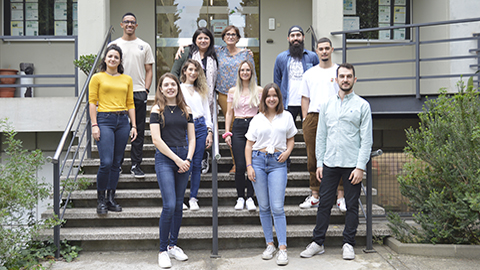Researchers from the Biosensors and Bioanalysis group at the IBB, led by María Isabel Pividori, will work on the development and validation of a tool to rapid and easily measure biomarkers of the severity of fever in childhood, with the aim of increasing the survival of children globally. The research will be carried out within the framework of the recently launched European project EChiLiBRiST.

EChiLiBRiST – Enhancing Children's Lives with Biomarkers for Risk Stratification and Triage, is a consortium of 13 institutions from Europe, the United Kingdom, Africa and Canada, among the Institut de Biotecnologia i de Biomedicina (IBB) of the UAB. It is convened to develop and clinically validate a quantitative point-of-care test for the measurement of severity biomarkers to improve risk stratification of fever syndromes and thus, enhance child survival. This 5-year project is funded by the European Union's Horizon Europe research and innovation programme and coordinated by Quique Bassat at ISGlobal.
The project consists of two distinct yet complementary workstreams – 1) Design and validation of the device and establishing the exploitation and regulatory pathways; 2) Clinical trials and sub-studies in 3 African countries to assess the impact of the introduction of the device for risk stratification purposes, to enhance outcomes, guide management, and save costs.
Maria Isabel Pividori, professor in the UAB Department of Chemistry and IBB researcher, will lead, with a budget of 350,000 euros, the workpackage of the technical development and engineering of the laboratory prototype, its analytical and clinical validation, and the subsequent development into a functional prototype for its further production and use in clinical trials.
"The technology behind the device is based on magnetic particles for the preconcentration of the biomarkers to enhance sensitivity, a mandatory feature of such a risk stratification tool.. The device will also be user-friendly and battery-powered, allowing its implementation at the point of care" to achieve rapid clinical decisions, explains Pividori.
Pividori is professor at the Chemistry Departament and also leads the Biosensors and Bioanalysis research group at the IBB, Her research is particularly focused on the design of rapid diagnostic tests and bioinstrumentation. Her expertise is related to improvements in terms of biorecognition, as well as the simplification of biodetection procedures, the integration of nanomaterials and the improvement of the analytical signal.
The researcher and her team will also collaborate with BioEclosion, a UAB technology-based spin-off confounded by Pividori, and the Eurecat technology centre.
One billion fever episodes worldwide
Fever is a cardinal signal of infectious diseases and over one billion episodes are recorded every year globally. On average, a child under 5 years of age in sub-Saharan Africa (SSA), experiences up to 6 episodes of fever annually. Though most episodes are mild and self-limiting, some can progress to life-threatening disease. In SSA, 50% of the fever-related deaths among children occur at the community level, without access to formal healthcare.
"Fever is an excellent warning system for clinicians, but it is often challenging to differentiate those fevers caused by life-threatening infections from those caused from self-limited and benign conditions. With the EChiLiBRiST project, we aim to measure severity biomarkers at the patient's bedside, with the hope to transform fever management globally. With a more targeted focus on those that really require prioritization, we can reduce death, disability, and health care costs," explains Quique Bassat, the Principal Investigator of the project.
Beyond the clinical and technological rigour of the study design, there are other notable aspects including its interdisciplinary approach to ensure that the new product is compatible for use in low-income settings, and that the data generated can be useful to model and predict impact and cost-saving in different scenarios. Additionally, the project has also committed to train 3 African graduates from the participating countries (Mozambique, Ethiopia and Gabon) with different disciplinary backgrounds to obtain a PhD.
"Building a common pathway from diagnosis to treatment is of utmost importance, especially in the African context with irregular access to health services," says Bàrbara Baro, Scientific Coordinator of the project. "EChiLiBRiST holds the potential to reverse child mortality trends from commonly treatable diseases in low-income countries."
Other institutions participating in the project are Eberhard Karls Universitaet Tuebingen, Fundaçao Manhica, Centre de Recherches Medicales de Lambaréné, Asphalion and Ospedale Pediatrico Bambino Gesu.






